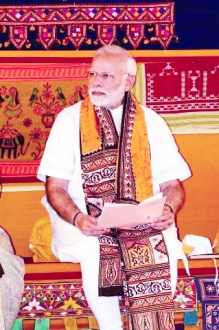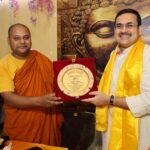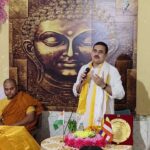ACHARYA MODI AND THE VISION OF VISVA BHARATI
- By : Anirban Ganguly
- Category : Articles

Modi’s words at the Samavartana Utsava reminded one of Syama Prasad’s observations at the Samavartana Utsava 68 years ago. It was a call to actualise the vision of building a ‘New India’
Dr Syama Prasad Mookerjee delivered the Convocation address at Visva-Bharati, Santiniketan, on December 25, 1950 and Prime Minister Narendra Modi, as Acharya — Chancellor of the university — delivered the Convocation address at the Samavartana Utsava on May 25, 2018.
Syama Prasad’s address at Visva-Bharati articulated the vision and delineated the path that the university could tread and the direction it could impart to the educational firmament of free India. Narendra Modi’s address at the same hallowed and historic precincts of the Amrakunja — sanctified in the past by the presence of India’s civilisational stalwarts — 68 years later was a call to Visva-Bharati to rediscover its world vision, to renew its civilisational anchor through Gurudev’s vision and to commit itself to the task of building a ‘New India.’ The inauguration of Bangladesh Bhavan, the presence, for the first time at the Samavartana, of two Prime Ministers, Sheikh Hasina and Modi — binding the two countries which celebrate Tagore — exuded a deeper symbolism.
The announcement that Prime Minister Modi would be visiting Visva-Bharati for the convocation made one recall the descriptions of a cold December morning 68 years ago when the Samavartana Utsava was presided over by the ‘Vice President’ of the university, Dr Syama Prasad Mookerjee. The Visva-Bharati News of January 1951, recorded how “separate enclosures for different categories of visitors under the overhanging branches of the historic mango grove and at one end, facing the auditorium, a raised dais beautifully upholstered, with its foreground decorated with alpona designs”, were done, setting the stage “for the enactment of the most important ceremony of the year…” Pandit Kshitimohan Sen, recited the traditional Vedic verses, Syama Prasad delivered the convocation address, a masterly and yet moving articulation of Gurudev’s educational vision, the present challenges and the future possibilities and role of a university founded on a vision of education and of learning that was different because it had been conceived of and had evolved from the Bharatiya ethos and had been inspired by the Poet’s quest of recovering India’s cultural, spiritual and civilisational self.
Having spoken of Gurudev’s inspiring educational vision, his lifelong quest of trying to usher in a new educational paradigm, Syama Prasad spoke of how ‘Education wisely planned and rightly executed will ultimately be the principal factor on which the future peace, progress and happiness of the Indian people will rest.’ He reminded those gathered at the Amrakunja that primary, secondary and university education — all stages demand a balanced attention from the State and the public. Expansion and not curtailment must be our motto; preservation of equality must be our constant aim. Cultural and scientific, technical and agricultural, all represent various aspects of educational development, none of which the nation, can afford to neglect. For Syama Prasad, institutions like Visva-Bharati, had ‘a great mission to perform in building up free India.’ Listening to Prime Minister’s Modi address at the Samavartana, one instantly remembered these words of Syama Prasad Mookerjee.
Modi’s entire speech was a tribute to Gurudev’s vision. The electrifying enthusiasm among young learners when Modi entered the precincts of the Amrakunja, expressed the pan-Indian popularity that he enjoys especially among youth. Instead of delivering a staid convocation address, from a pre-determined script, Modi spoke from the heart, with emotion, with conviction, with emphasis and with reverence; these were emotions that young Bengal, despite the decades’ long suppression, can still relate to. The chants of ‘Modi, Modi, Modi’ that filled the air, the applause that portions of his speech repeatedly received all pointed at the deep chord that he had touched in the heart of young Bengal.
For the liberal fundamentalists, the self-appointed gate-keepers and high priests of Tagore’s legacy who have done little in their lifetime to stem the slide that Visva-Bharati had seen over the years, these expressions of emotion were extremely base, these, they argued, had no place in an occasion that had always followed a routine. Unfortunately, these self-appointed custodians of Tagore’s legacy have themselves fallen into a groove and have become far removed from the aspirations of Indian youth. Their interpretations and presentations of Tagore have stagnated and calcified, they have been incapable of reinventing Gurudev, allowing his legacy to be either held captive by a coterie or to be regulated according to a certain political ideology and belief, that had once denigrated and castigated Tagore and his philosophy and world view altogether.
For these types, Modi’s presence, his open hearted call to reinvent Visva-Bharati, his exhortations to students of the university to link themselves to national service and uplift and to dedicate themselves to realising the dream of a ‘New India’, his articulation of why Visva-Bharati continues to be a special place with a unique responsibility towards society and country, was anathema, it was an address that they were not used to. They were not used to these words which were meant to inspire a generation to renewed national action, these were not empty platitudes and hollow pledges made to Gurudev’s vision, instead they were words that carried with them the conviction of one who has himself grown from the soil of Bharat.
Modi spoke of how Visva-Bharati for him, was a temple, a temple created by Tagore, in which every grain breathed of Gurudev’s presence and touch. Modi spoke of Gurudev’s global vision, his wide travels and his acceptability across the world, the enthusiasm and emotions that he continues to generate, the academic, cultural and civilisational interest that he continues to evoke. Referring to Tagore’s famous submission to the Mahatma on the need to preserve Visva-Bharati because it carried the entire treasure of his life, Modi exhorted those gathered to work in that spirit of Tagore’s sacrifice. One remembered the descriptions of that last meeting of the Poet and the Mahatma in February 1940, when, as Krishna Kripalani writes in his classic biography of Tagore, how the Poet ‘put a letter in his [Mahatma’s] hand in which he requested him: ‘Accept this institution under your protection, giving it an assurance of permanence if you consider it to be a national asset. Visva-Bharati is like a vessel which is carrying the cargo of my life’s best treasure, and I hope it may claim special care from my countrymen for its preservation.’ Naturally those who have — through a lifetime — extracted from the legacy of Visva-Bharati but have given mighty little in return would not like Modi to remind them of this touchingly profound last wish of the poet, a wish that they have failed to fulfil by neglecting Visva-Bharati or by being silent when the institution tumbled over the years.
Modi’s address was Acharya like; he began and ended as an Acharya, an Acharya whose responsibility it is to lay a wider direction for his university. Visva-Bharati continues to be the only university in the country in which the Prime Minister of India is the Acharya and Modi approached the entire Samavartana Utasava in the spirit of an Acharya. He dedicated about eight minutes of his 28 minutes long speech on articulating how Visva-Bharati could widen its ambit and reach of village development, intensify its work of nature conservation, take advantage of the variety of educational initiative that the Union Government had initiated to link Indian higher education to global educational institutions and faculty, he spoke of the mission of Swacch Bharat, he spoke of the need to work to actualise the vision of ‘New India’ by 2022, the 75th year of India’s independence.
In short, he called on the students and the university to link themselves and itself to the wider and rapidly changing world, to become a principal agent of societal transformation, to desist from living in isolation, to manifest the spirit of Gurudev’s vision of the world being one home and one family. How are these words and appeal contrary to all that Tagore stood for? Can Gurudev’s vision be preserved and presented through hollow ritualism; can it be truly communicated through polemics and routine claptraps as has been mostly done in the past? Modi’s call to those, especially the young who were part of Visva-Bharati, was to graduate into global citizens and yet be rooted in the vision and experience of India. His call essentially was for Visva-Bharati to reinvent itself and to rejuvenate its core founding ideal and vision. His words once again reminded one of Syama Prasad’s own final observations at the Samavartana Utsava 68 winters ago, when he had said:
May the task of rediscovering the Indian mind, fully conversant with our rich heritage and adequately equipped with science and technology, be undertaken by our universities in a spirit of dauntless courage and devotion. In the great task of the reawakening of the soul of India, may Visva-Bharati play its worthy part and thus function as a noble memorial of its illustrious founder.
Modi’s call too was for Visva-Bharati to rediscover its civilisational role in the present re-awakening of the soul of India. It is for Visva Bharati, for all those who selflessly feel concerned about Gurudev’s vision, for all those who genuinely feel connected to his legacy, to respond to Acharya Narendra Modi’s call. It is an opportunity that has presented itself after a long hiatus…seizing the opportunity would proclaim the victory and reinforce the self-renewing immortality of Gurudev’s vision.

















